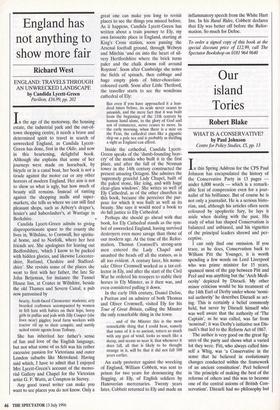England has not anything to show more fair
Richard West
ENGLAND: TRAVELS THROUGH AN UNWRECKED LANDSCAPE by Candida Lycett-Green Pavilion, £16.99, pp. 202
In the age of the motorway, the housing estate, the industrial park and the out-of- town shopping centre, it needs a brave and determined spirit to travel in search of unwrecked England, as Candida Lycett- Green has done, first in the Oldie, and now in this heartening, delightful book. Although she explains that some of her journeys were made on horseback, by bicycle or in a canal boat, her book is not a tirade against the motor car or any other horrors of modern England. Her aim is not to show us what is ugly, but how much of beauty still remains. Instead of ranting against the shopping malls and super- markets, she tells us where we can still find pleasant shops, such as Arbery's draper's, hosier's and haberdasher's, at Wantage in Berkshire.
Candida Lycett-Green admits to giving disproportionate space to the county she lives in, Wiltshire, to Cornwall, her spiritu- al home, and to Norfolk, where her best friends are. She apologises for leaving out Bedfordshire, 'which I know to be packed with hidden glories, and likewise Leicester- shire, Rutland, Cheshire and Stafford- shire'. She revisits some of the places she went to first with her father, the late Sir John Betjeman, for instance the Tunnel House Inn, at Coates in Wiltshire, beside the old Thames and Severn Canal, a pub now patronised by
hearty, fresh-faced Cirencester students; arty bearded craftsmen accompanied by women in felt hats with babies on their hips; horsy girls in puffas and jods with Jilly Cooper (she lives near) giggles; local farm workers with tractor oil up to their armpits; and nattily suited estate agents from Tetbury.
She has inherited her father's sense of fun and love of the English language, but not what some of us felt was his rather excessive passion for Victoriana and outer London suburbs like Metroland. Having said which, I have to admit that I enjoyed Mrs Lycett-Green's account of the memo- rial Gallery and Chapel for the Victorian artist G. F. Watts, at Compton in Surrey. Any good travel writer can make you want to see places you do not know. Only a great one can make you long to revisit places to see the things you missed before. As it happens, Candida Lycett-Green has written about a train journey to Ely, my own favourite place in England, starting at King's Cross station, soon passing the Arsenal football ground, through Welwyn and Mitchin 'and on into the heart of sil- very Hertfordshire where the brick turns paler and the chalk downs roll around Royston'. Soon after Cambridge she notes the fields of spinach, then cabbage and huge empty plots of bitter-chocolate- coloured earth. Soon after Little Thetford, the traveller starts to see the wondrous cathedral of Ely:
But even if you have approached it a hun- dred times before, its scale never ceases to astonish, and the mere fact that it was built from the beginning of the 11th century by human hand alone, to the glory of God and not of commerce, never ceases to move. In the early morning, when there is a mist on the Fens, the cathedral rises like a gigantic ship on a pale sea and is probably as thrilling a sight as England can afford.
Inside the cathedral, Candida Lycett- Green speaks of the 'dumb-founding brav- ery' of the monks who built it in the first place, and after the fall of the Norman tower in the 14th century constructed the present amazing Octagon. She admires the supremely graceful Lady Chapel, built of the palest stone, like icing, and with huge clear-glass windows'. She writes so well of Ely Cathedral, as of the other churches in this book, because she perceives the pur- pose for which it was built as well as its beauty. She says it would need a book to do full justice to Ely Cathedral.
Perhaps she should go ahead with that book, for Ely Cathedral stands as the sym- bol of unwrecked England, having survived destroyers even more savage than those of our modern age. At the time of the Refor- mation, Thomas Cromwell's strong-arm men entered the Lady Chapel and smashed the heads off all the statues, as is all too evident. A century later, his name- sake Oliver Cromwell worked as a tax-col- lector in Ely, and after the start of the Civil War he ordered his troopers to stable their horses in Ely Minster, as it then was, and even considered pulling it down.
In the early 18th century, Daniel Defoe, a Puritan and an admirer of both Thomas and Oliver Cromwell, visited Ely for his Tour of Great Britain, calling the Minster the only remarkable thing in the town:
. . . and of the Minster this is the moat remarkable thing that I could hear, namely that some of it is so ancient, totters so much with any gust of wind, looks so much like a decay, and seems so near it, that whenever it does fall, all that is likely to be thought strange in it, will be that it did not fall 100 years earlier.
An early protester against the wrecking of England, William Cobbett, was sent to prison for two years for denouncing the flogging, at Ely, of English soldiers by Hanoverian mercenaries. Twenty years later, Cobbett returned to Ely and made an inflammatory speech from the White Hart Inn. In his Rural Rides, Cobbett declares that Ely was better off before the Refor- mation. So much for Defoe.
To order a signed copy of this book at the special discount price of f12.99, call The Spectator Bookshop on 0181 964 9640


































































 Previous page
Previous page